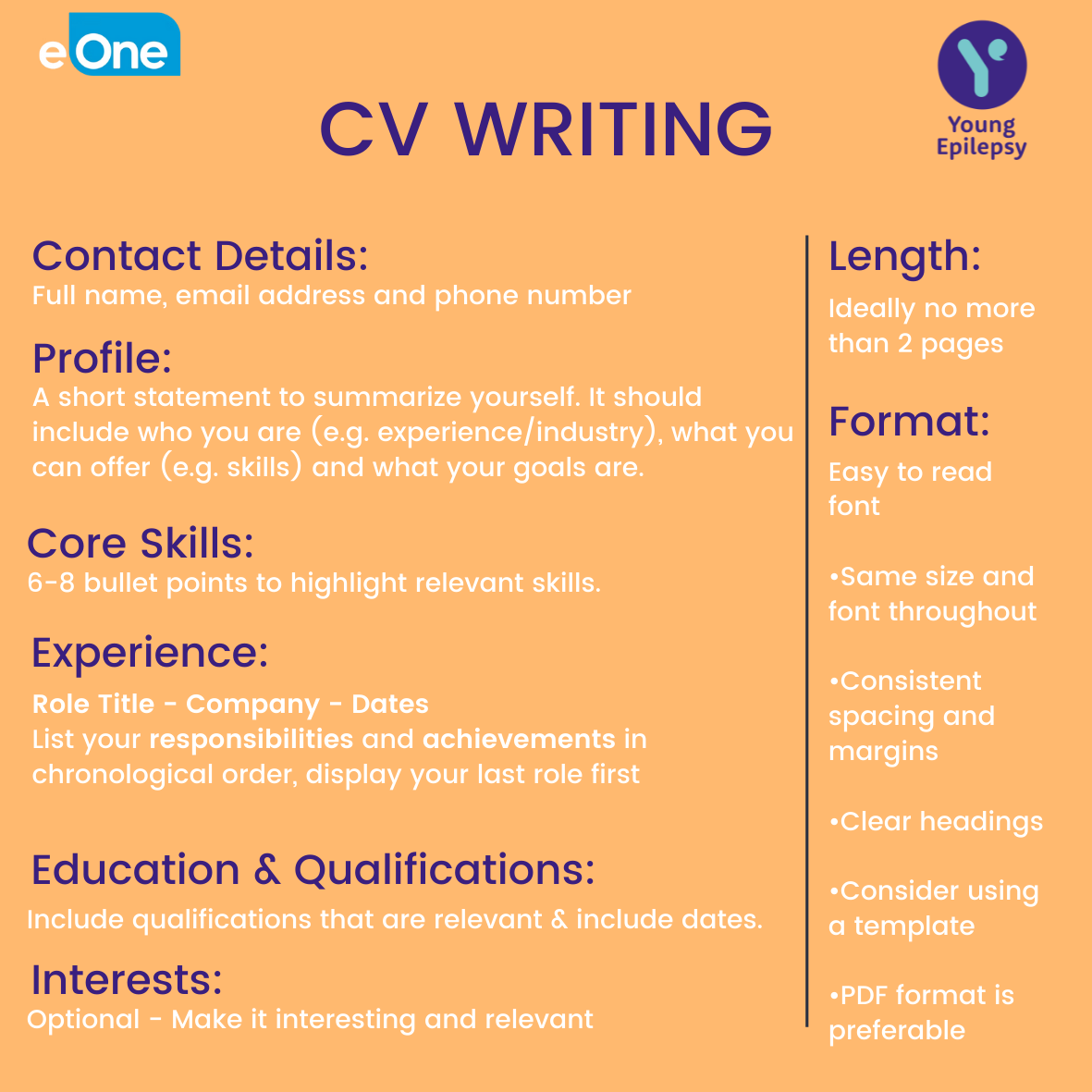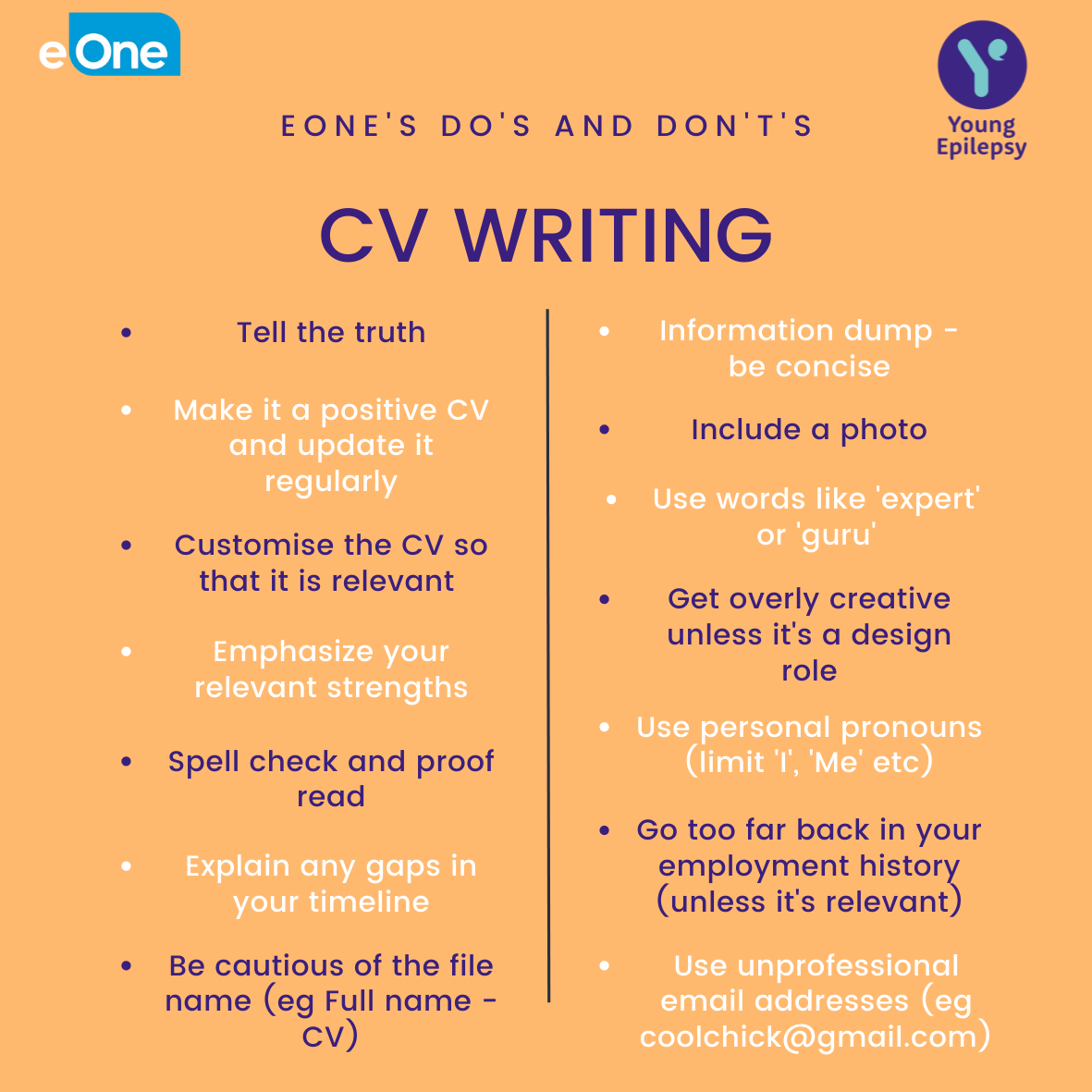Top Tips for Writing your CV
Stats from early 2021 show that only 34% of people with epilepsy were in employment and were paid on average 11.8% less than non-disabled people. Although these stats may have been influenced by the pandemic, it is clear that existing employment schemes need to be adapted to support the people being affected by the employment and pay gap.
We know this affects you as young people with epilepsy, and how these statistics alone can be quite scary and disheartening. So we sat down with global and hugely successful play and entertainment company, eOne, who kindly offered up some of their top tips and experiences to support you on your career journey.

Contact Details
Full name, email address and phone number is sufficient.
Profile
A short statement to summarize yourself. It should include who you are (e.g. experience/industry), what you can offer (e.g. skills) and what your goals are.
Core Skills
6-8 bullet points highlight relevant skills.
Experience
Role Title - Company - Dates
•List your responsibilities and achievements
•In chronological order, display your last role first
Education & Qualifications
•Include qualifications that are relevant
•Include dates.
Interests
•Optional.
•Make it interesting and relevant
Length
Ideally it should be no more than 2 pages
Format:
•Easy to read font
•Same size and font throughout the CV
•Consistent spacing and margins
•Clear headings – make it easier for the reader to go to the section that they are interested in
•Consider using a template
•PDF format is preferable
Top tips for CV writing and format

DO:
Tell the truth
Emphasize your relevant strengths
Be cautious of the file name (eg Full name - CV)
Make it a positive CV and update it regularly
Customise the CV so that it is relevant
Spell check and proof read
Explain any gaps in your timeline
DONT:
Information dump - be concise
Go too far back in your employment history (unless it's relevant)
Use unprofessional email addresses (eg coolchick@gmail.com)
Include a photo
Use words like 'expert' or 'guru'
Get overly creative unless it's a design role
Use personal pronouns (limit 'I', 'Me' etc)
What really stands out to an employer on a CV?
What about young people with less work experience?
We know a major concern for young people especially is having less career experience to broaden their CV. Daniella discusses using the education and qualifications section to fill in the gaps and not let your achievements and development during your years in education go forgotten.
“The education and qualifications section is really going to depend on how long your CV is. I would say that this section is really important for candidates where they may be lacking experience early on in their career.
It does fill that space if you’ve got extra space on your CV. I know that when you get to more senior positions with more years’ experience this section might not be as relevant. For the more junior positions it is really helpful.”
Should I disclose my health condition?
One of the most asked questions amongst young people is knowing at what point in the process, from CV writing through to interview, is it best to disclose to the HR department about any disabilities or health conditions.
“I would say to disclosure this information as soon as possible, so as soon as you sign the contract or anything. Some HR teams do incorporate this into the onboarding process, so when you’re filling out personal information they might ask if you have any disabilities or conditions that you want to disclose.
In the UK you’re not obliged to say anything, but I really do encourage people to, as it enables your managers and the HR team to make sure we can put in place any reasonable adjustments and give you the best support possible.
You are also protected under the Equality Act 2010, so that means that you cannot be discriminated against because of your disability or condition.”
